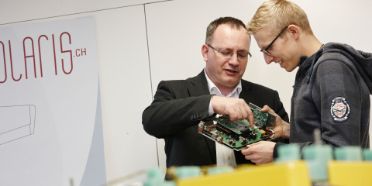Advanced control systems allow to improve the system performance. This improvement comes for free in terms of cost of production when a better software can be implemented using the same hardware. Our research work focuses on the 3 following subtopics:
- High Performance, Sensorless Control of Electric Drives
Sensorless control of electric drives is a very popular asset to increase robustness and reduce cost. We develop new high performance, sensorless control algorithms for the sensorless control of high precision motors.
Optimized PWM and pulse patterns
Smart PWM schemes or optimized pulse patterns enable improved harmonic performances and/or reduced converter losses. As for the advanced control system, it generally enables improved performance at no or only low additional production costs.
We develop efficient PWM schemes for a wide range of power converters. We have extensive experience in implementing these state-of-the-art microcontrollers for complex converters or PWM schemes, we have experience in implementing PWM schemes on FPGA.
Optimal and model predictive control for high performance
The use of optimal control techniques such as Model Predictive Control (MPC), Kalman filters and system identification generally allow to improve control performance in terms of precision, bandwidth, robustness and reduced noise impact.
We develop simple and very powerful control techniques to improve the performance of power electronic systems. We have extensive experience in implementing powerful control schemes on state-of-the-art microcontrollers.
Optimized systems
The use of optimization enables designing the power converter solution that best matches the specifications using computer power.
Our research work concentrates on
- Designing precise mathematical models of power converters and their components suitable for use in optimization algorithms
- Formulating the design of power converters as optimization problems. If the control system and component parameters are often strongly linked, we also deal with joint optimization, in which we simultaneously optimized converter and control system parameters


